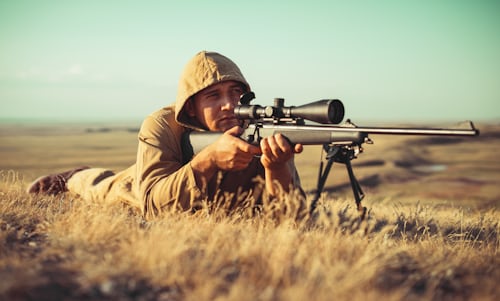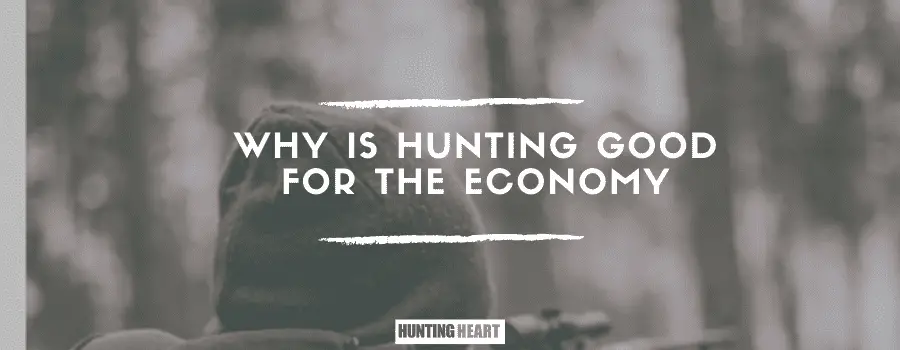As an Amazon Associate I earn from qualifying purchases.
Our Associate portal can be found here
“Why is hunting good for the economy?” I’ve often wondered if my hunting contributes in any way to economic development. Perhaps it’s the opposite. So I embarked on a self-discovery journey to find out.
Hunting impacts the economy in numerous ways. Hunters spend on clothing, gear, firearms, ammo, and training – generating income. More is collected from licenses and permit fees imposed by local and state governments. The practice also supports tons of jobs in various sectors.
Many people are unsure where they stand when it comes to hunting. It creates a moral dilemma whether killing certain wild animals is beneficial to anyone. If this is your conundrum, stick around. I might just sway your opinion.
Reasons Why Hunting is Good For the Economy
So, why is hunting good for the economy? Read on to see just how many ways you contribute without even realizing it.
Hunting Spending
According to a recent study by Statista, as of 2021, the average annual expenditure on hunting and fishing equipment (excluding ammo) in the United States is $53.44 per consumer unit.
Every year, American hunters spend close to $6.4 billion on hunting gear, $5.3 billion on travel, and $8.4 billion on other “significant” items. All of this adds up to a substantial annual cost of $2,800 per hunter. Which all goes into creating and advancing businesses and jobs.
Supports Emerging Markets
The economy is also impacted by direct sales of items derived from hunted prey. In some places, you can find a thriving market for bushmeat. States like Texas even compensate hunters per pound of hog meat presented from a hunt. On top of the prize money and hourly minimum wage in South Florida, you can sell the python skins to collectors or designers of custom goods. Who knows, you may even find an exotic cuisine restaurant that serves snake meat.
Creates Employment Opportunities
Hunters provide financial support for creating thousands of jobs directly involved in the manufacture, sale, or provision of hunting and outdoor products and services.
They contribute to the maintenance of thousands of jobs in factories, ammo and hunting stores, restaurants, and hotels. Aside from hunting guides, several people have made a living by trapping or shooting animals declared bounty.
Generates Revenue
Hunting generates nearly $12 billion in federal, state, and local tax revenue each year. State hunting license fees and firearm permits are the biggest contributors. Not to mention the funds raised through excise duty collected under the Federal Aid (Pittman-Robertson Act) in Wildlife Restoration Act.
A large chunk of this income is channeled to supporting conservation efforts. Donations are also obtained from sportsmen’s organizations and individual hunters. It also manages wildlife, and their habitats keeps the public safe by supporting low-cost hunter education and opens and maintains access to resources such as shooting ranges.
Supports Sustainability
Businesses in small communities located near significant hunting zones benefit from the income generated from hunting activities. If you want to know how many hunters travel to hunting destinations do not wait until you get to the fields or woods. Just walk through any airport or train station during hunting season and observe the number of people in camo or blaze orange hauling heavy-looking gear bags.

Local businesses collect hunter dollars through various channels:
- Area guides hired by visiting and beginner hunters to offer expert help and guidance.
- Hotel rentals.
- Purchases from stores.
- Meals at food joints.
Furthermore, hunting reduces the population of invasive species that would otherwise cause millions of losses in damages to vegetation and cultivated land.
Drives Innovation
Modern-day hunting culture has come a long way from what it used to be a few decades ago. This is mainly attributed to advancements in the production and sales of bows, firearms and related accessories, ammunition, calls and baits, clothing, treestands and blinds, wildlife seed, ATVs, and other hunting-related commodities.
As technology advances, we can only anticipate more innovation to enhance the hunter’s experience. Take the CAV-X, a military-grade bullet that can be used underwater. Such tech would be revolutionary to marine hunters. We may soon see the development of powerheads that are effective without contact shooting.
How to Make Money From Hunting
Even the most ardent hunter has wondered how to make money while doing what they love – hunting. Due to bans and restrictions, people take up hunting primarily for recreation, but is it possible to make money from this pastime?
Yes, it is! Here are some viable ways you can generate money from hunting.
Bounty Hunting
Animal bounty hunting is common in several places, especially those battling invasive species. Most prey requires hunters to pay a fee, either to the owner of the land they’re hunting on or for a license to hunt in the area. However, in the case of bounty hunting, the local government pays a stipend to hunters who bring in proof of a kill.
Find out if your state has a bounty on wild animals to maximize the opportunity while doing what you love.
Become a Hunting Guide
Since more people are taking up hunting as a hobby, travel has increased in the hope of encountering exciting wild game opportunities. There might be visiting hunters or newbies requiring expert local guidance. If you enjoy hunting, why not turn your passion into a career? You can freelance or seek a job at a tour company.
Trophy Hunting
Although the practice is surrounded by tons of controversy surrounding its morality, it’s still a legit way of monetizing hunting. You can enjoy trophy hunting as long as it’s legal and you’re not after endangered species. Trophies can be sold at auctions for a substantial figure to collectors, museums, or taxidermists.
The Bottom Line
The next time someone asks, “Why is hunting good for the economy?” You know what to say. The knowledge that I am contributing to the good of society every time I do what I love is enough to keep at it. Next time I go varmint, hog, or deer hunting, I may even bring my kids along. It would certainly serve the economy well, having a few more hunters in the fields and woods.
Amazon and the Amazon logo are trademarks of Amazon.com, Inc, or its affiliates.

36 years old, been hunting and fishing my entire life – love the outdoors, family, and all kinds of hunting and fishing! I have spent thousands of hours hunting hogs and training hunting dogs, but I’m always learning new stuff and really happy to be sharing them with you! hit me up with an email in the contact form if you have any questions.



